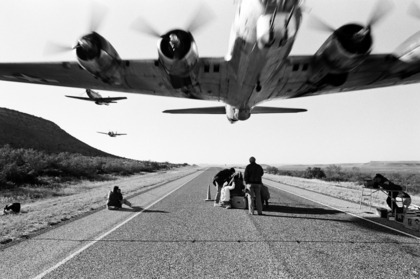
Musings
Liberty lost
Posted by Colin Higton
I was deeply saddened this week to see the Liberty Bell burning in a field, and along with it 77 years of history.
If you don’t already know, the Liberty Bell is a B17 Flying Fortress that survived the bombing raids on Dusseldorf towards the end of the second world war. This week, this magnficent plane was being flown to Indianapolis when one of the engines caught fire. The crew were able to land the plane – and thankfully all escaped unhurt – but then they had to stand and watch as the plane they had restored to factory condition slowly burned as the fire fighters were unable to get their vehicles across the muddy field.
The plane cost over 3 million dollars to restore, and the running costs for such planes is astronomically high – with insurers and the FAA putting them into the same category as commercial airliners. The problem is even more acute for cold war jet aircraft like our own Vulcan that is now thankfully flying again, and the Victor andLightnings that are air-worthy but prevented from flying by costs or regulations.
So why do we bother? Why not simply put them in a museum where they will be safe – or, since they are after all weapons of mass destruction, just leave them in the scrap yards they were rescued from?
The answer is obvious I’m sure.
It may be expensive to keep these aircraft flying, and there are a thousand things we could spend the money on instead. But take a look at the money we put into promoting the arts and our heritage – lottery funding for ballet and alternative theatre, money to keep significant paintings and sculptures in Britain, art galleries to make sure you and I can see the works of great artists for free.
These aircraft may not be high art, and may not be accorded the same respect or lent the same cultural significance – but they are not only part of our recent history (and part of what kept us from falling prey to tyranny) they also represent a magnificent achievement for a species that only mastered flight in the last hundred years.
In the case of the Vulcan, Victor and Lightnings, they also represent the very pinnacle of Britain’s achievements as the nation that brought the world the industrial Revolution. They perfectly capture the brief moment after the second world war when we still inspired and led the world in aircraft design, and when no other country could better our achievements in engineering – and just before we realised that we were incapable of taking advantage of that lead and we lost it forever.
To lose these aircraft forever (like we could have lost the Liberty Bell) would be appalling – but to have the opportunity to see them fly and choose not too would quite simply be a crime.
Back to the Blog